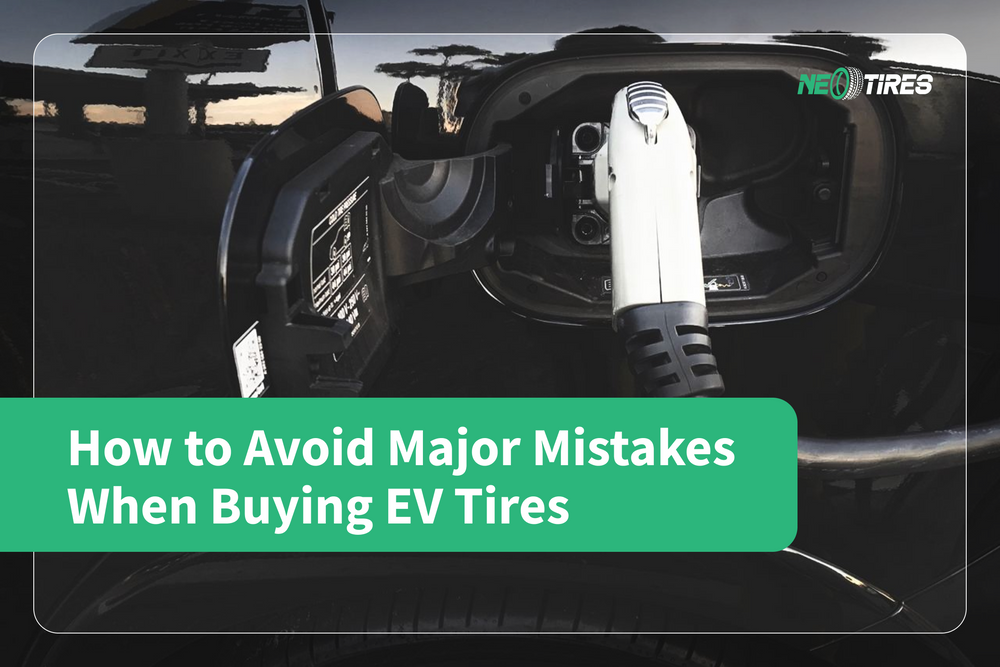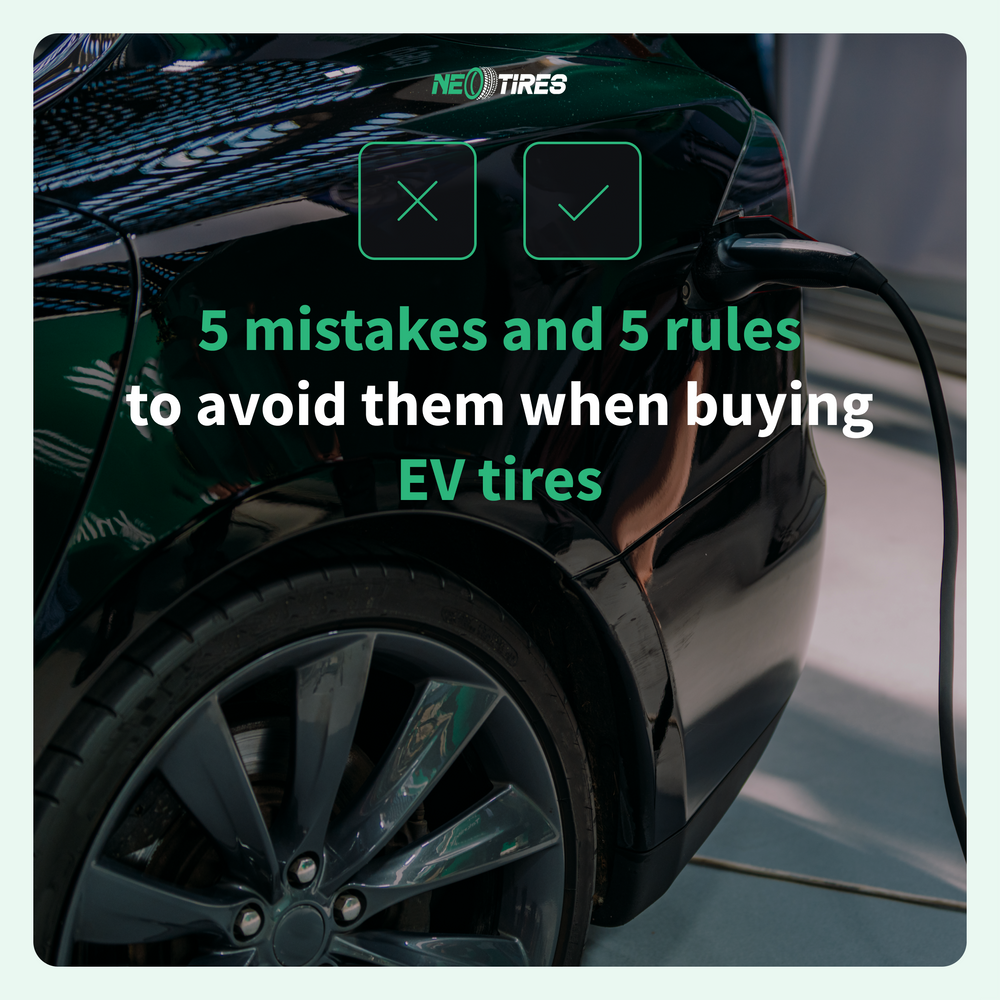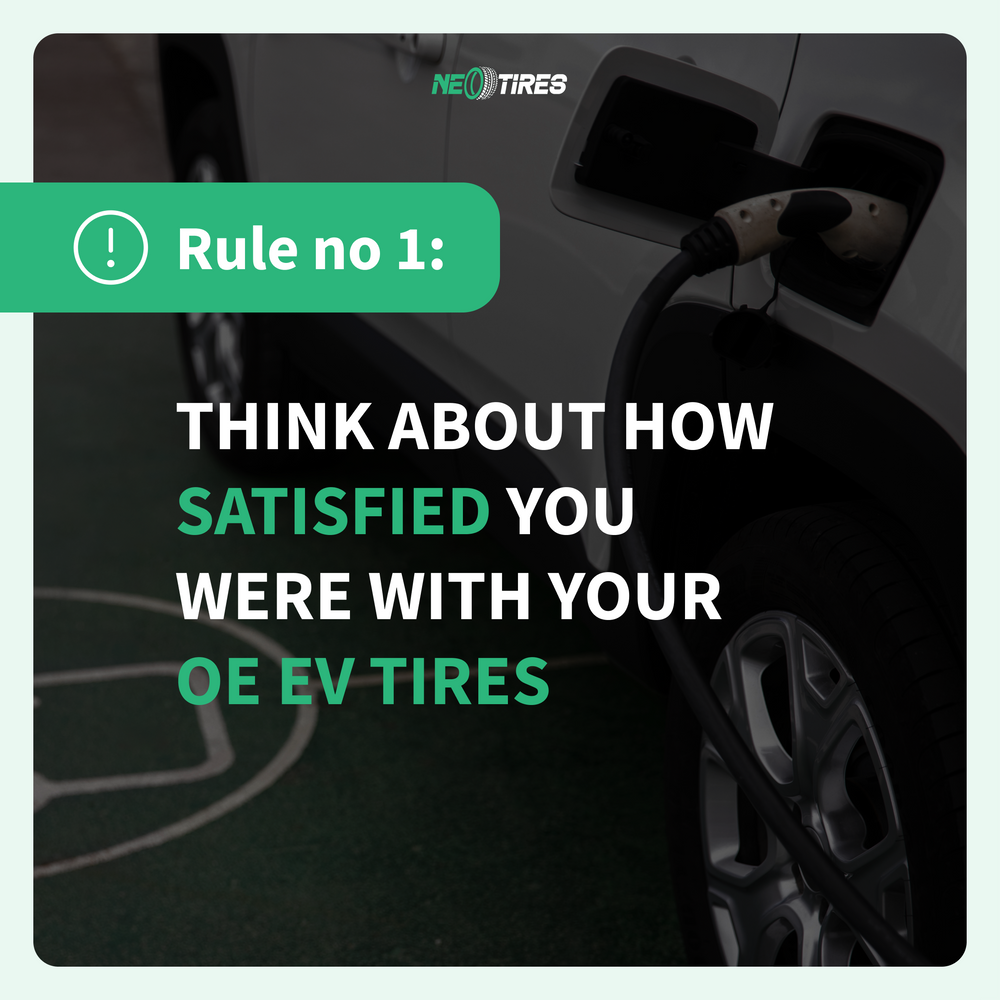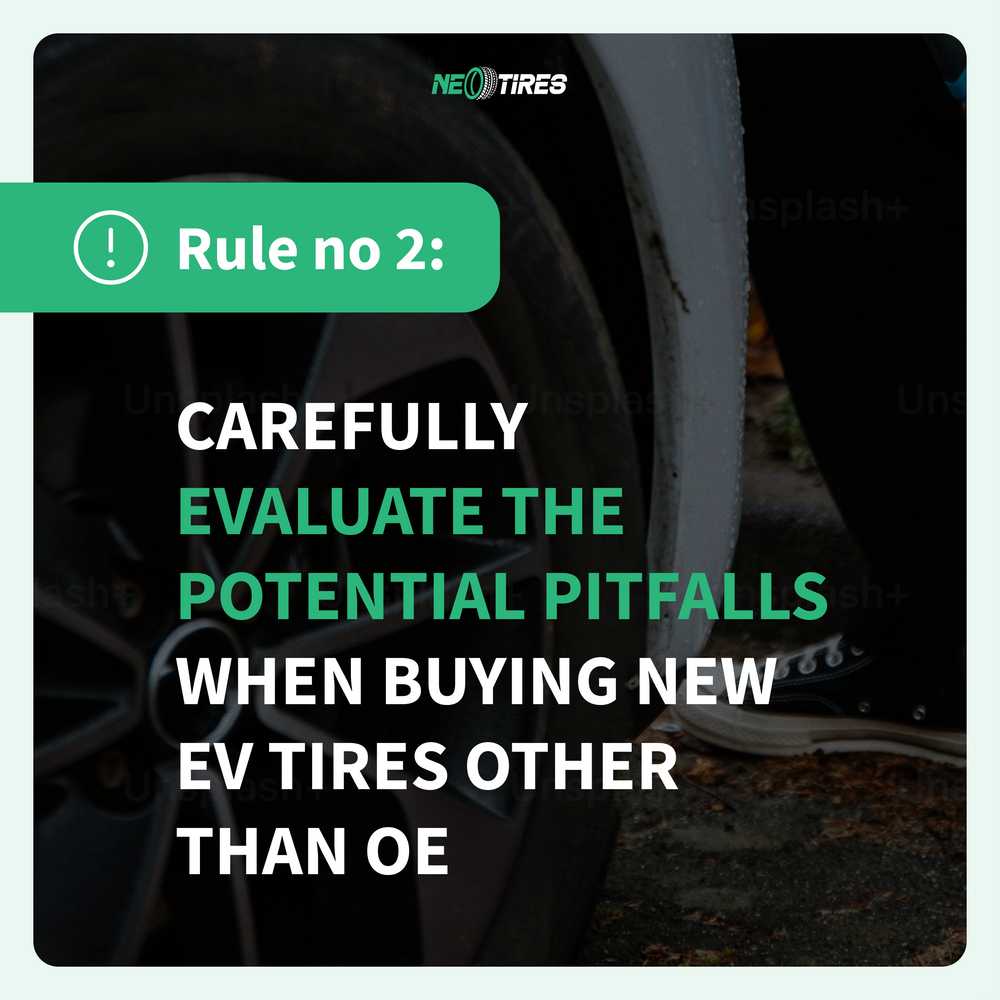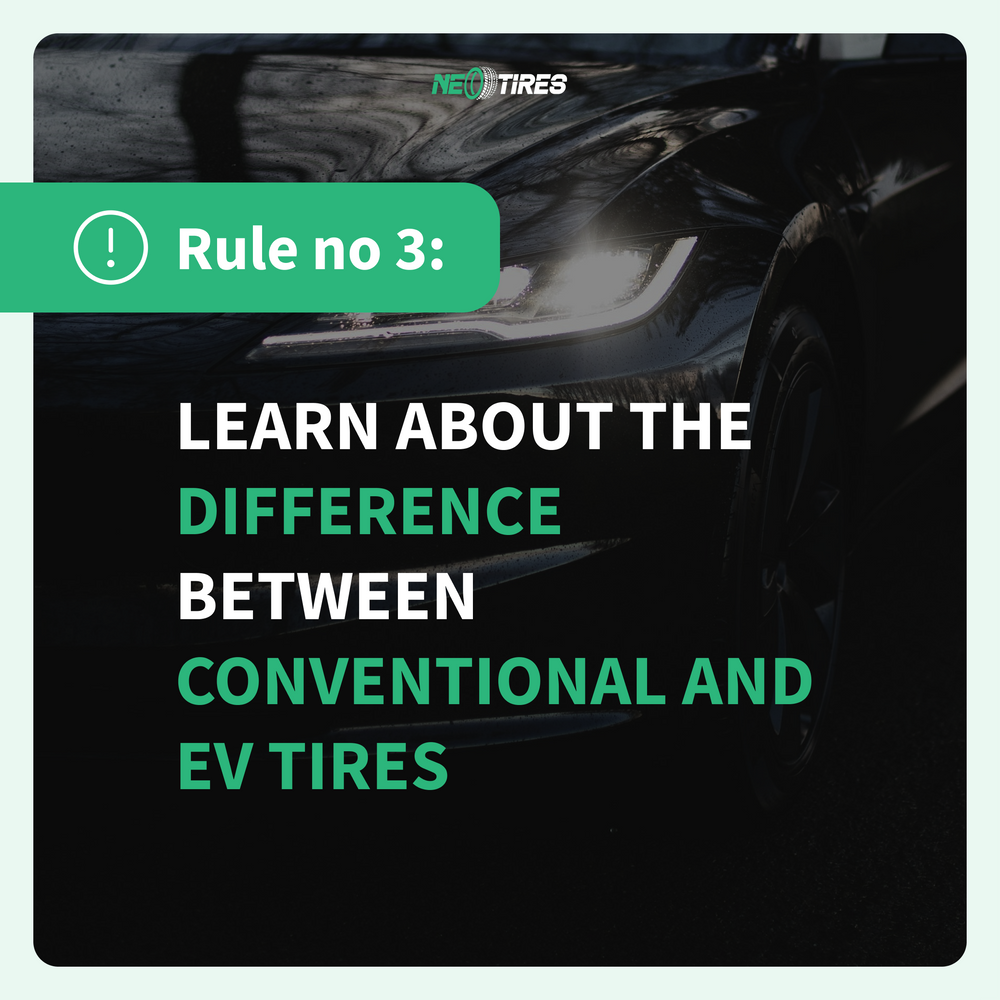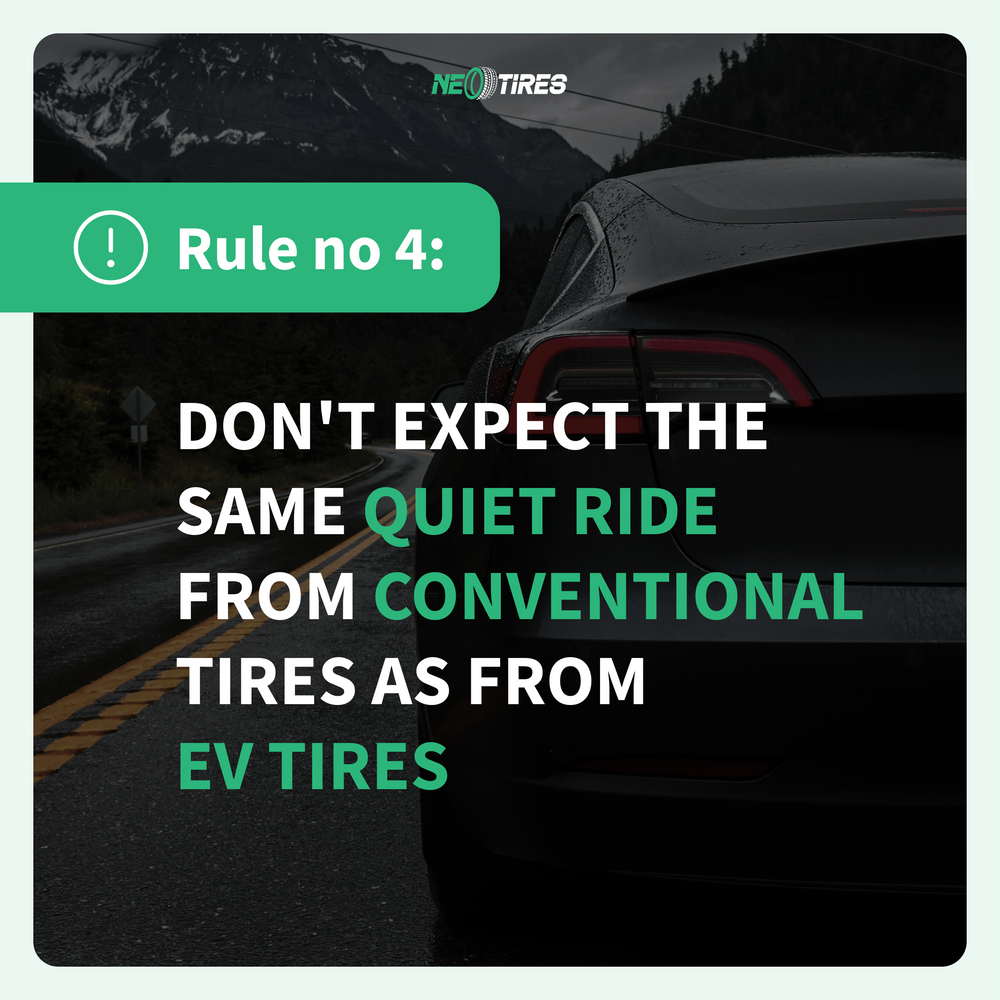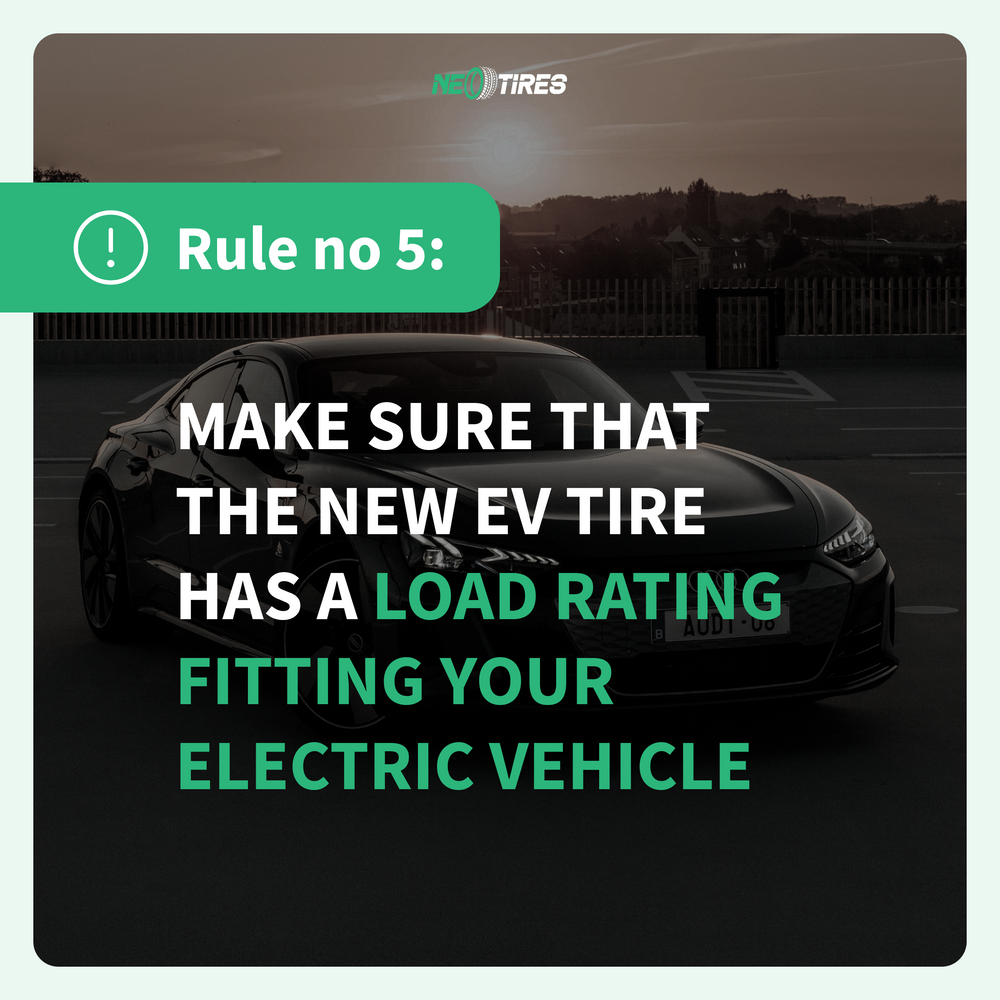Without a doubt, electric vehicles are increasingly capturing the market. It seems that the advantages of range, reduced costs on fuel, and comfort are convincing reasons for drivers to switch to electric cars. However, like any other type of vehicle, EVs have tires with a certain shelf life. If your EV tires need replacement already, you must be very careful with choosing a suitable set. In the previous article, we talked about how to choose the right tires for your electric car. Today, however, we will mainly talk about the most frequent mistakes that threaten drivers to get the wrong tires.
The point is that the process of choosing EV tires differs a little from that of conventional tires. As a result, many drivers make mistakes in this process. We encourage you to take a look at this post to avoid the most frequent errors in the selection of EV tires. Say no more, let's get down to business.
Not Considering The Experience You Had With Your OE EV Tires
The first thing most EV drivers do is to choose "any tire" as long as it features the "eligible with EVs" label. This is not necessarily totally wrong, because, after all, EV tires match the specifics of electric vehicles. Still, our recommendation is to start evaluating how satisfied you are with the tires with which your electric vehicle left the factory.
The point is that tire makers collaborate closely with electric vehicle manufacturers. Their goal is to adapt the 2 components (the vehicle and tires) as perfectly as possible to each other. In most cases, the original tires, i.e. the OE ones, are the most suitable from the perspective of efficiency, grip, and noise suppression. These fit like gloves in the EV specs because they were designed specifically for this vehicle.
Any non-OE EV tire would also fit that vehicle. However, they are more universal than perfectly matching. So, some performance or comfort ratings might be slightly lower than those you are used to in OE tires.
We do not claim that OE tires are the ultimate option. Instead, we just want to draw your attention to this subtle detail. Perhaps, you don't need to persistently search for an EV tire model, the solution might even be a set of OE tires.
So, the bottom line is that you should evaluate how happy you are with your existing tires. If there are no reasons that would make you look for alternatives, go for OE EV tires without remorse. If there is still something you could improve, then it is when you leave room for non-OE options.
Ignoring Unexpected Pitfalls With EV Tire Replacement
Statistics show that many drivers look for performance improvements when changing tires. This is valid both for drivers of conventional vehicles (ICE) and electric ones. A performance boost never hurts, right? In this sense, the number one option is switching to tires with a more agile and dynamic performance, i.e. UHP tires.
While the idea sounds logical and rational, drivers must expect the potential "side effects" if we can call them that. It is more precisely about a potential tradeoff that EV drivers must expect. While tenacity and dynamics are gained with UHP tires, rolling resistance is expected to increase to some extent. This effect is somewhat more pronounced in electric vehicles than in conventional ones, as strange as it may sound.
With this in mind, there is a reversal of the effects: while drivers experience lower rolling resistance with UHP tires on ICE vehicles, EV owners may experience adverse changes. With higher rolling resistance, the electric vehicle suffers a range reduction. This is another reason why experts recommend replacing old tires on EVs with OE new ones. As we mentioned before, OE EV tires are specially designed to keep the rolling resistance as low as possible, offering optimal grip and traction performance.
Our goal is not to discourage you from choosing UHP tires for your EV. We only want to inform you about the potential changes you should expect whenever you switch to another type of tire. The more informed you are, the better the choice you make.
Ignoring the Differences Between Conventional and EV Tires
It may sound strange to you, but many drivers still believe that a few extra kg of EVs do not make a big difference to the tires. This is probably the biggest mistake of all. Conventional vehicles weigh at least 10% less than their electric counterparts. This difference plays a huge role in tire wear.
The heavier the vehicle, the more sensitive the tires are to wear and tear. EV tires are specially designed to cope with the strong torque of electrical constructions. Also, they withstand the weight of the battery, which can weigh up to 500 kg.
With such specifications of electric vehicles, their tires automatically undergo a more substantial wear force. So, regular tires on an EV are inevitably synonymous with super early wear. Of course, there are plenty of other factors contributing to tire degeneration. Still, extra weight is one of the major factors.
Noise Issues
What's more, tire damage is not the only negative outcome to expect when thinking about conventional tires on an electric vehicle. A regular tire on an EV is the direct ticket to a noisy driving experience. The EV alternatives have special noise suppression technologies, which, again, are carefully adapted to the specifics of the electric vehicle. Otherwise, the conventional tires will allow the noise to enter the cabin, which goes against an EV-specific driving experience.
Indeed, an electric vehicle a priori does not make as much noise as an ICE (internal combustion engine). This is due to the electric motor which is silent by its nature. Still, EV tires are a complementary component that dampens road acoustics through their special technologies. The foaming technology can be found in some conventional tires. But it is not as noise-suppressing as in an EV tire.
However, this is not a set-in-stone rule. A large part of drivers are not satisfied with their OE EV tires from the perspective of ride quietness. In this case, they might look for EV tires with advanced noise-suppressing technologies to solve the issue. So, various scenarios are possible. What truly matters is to be informed and to take into account all these aspects.
Overlooking The EV Tire Load Index
You probably know what the load rating of any tire means. If not, then reading our explanatory article about tire load indexes is a must. Vehicles with a heavy body need tires with a high load rating to cope with the pressure and force pressing on them. Electric cars in particular need a higher load index due to their large and extra heavy batteries.
Precisely for this reason, tire makers have developed the concept of "HL tires" which stands for High-Load Tires. These are the most suitable, especially for the latest EVs which tend to be much heavier than the versions from previous years. In addition, EV tires might come with different load ratings just like conventional ones. Overlooking this criterion can lead not only to defective driving performance but also to safety threats.
One of the worst mistakes is choosing EV tires with the wrong load rating. HL or not, EV tires must match the weight of the electric vehicle. Notably, many drivers are misled by tire sizes. EV tires can have the same size and dimensions while featuring different load indexes.
EV Tires FAQ
Do EVs Require Special Tires?
Electric vehicles do require special tires because they are much heavier than regular ones. As a result, the additional vehicle weight subjects the tires to a greater effort. A normal tire does not withstand this load as well as an EV-oriented one. The special EV tires have a more solid construction and a more resistant rubber formula. In addition, tire makers pay particular attention to improving grip in EV tires because increased inertia and greater vehicle mass can negatively impact braking distance. So, electric vehicles need special tires specially built for the specifics of these vehicles.
Why Are EV Tires So Expensive?
The higher price of EV tires is explained by the more complex construction compared to conventional tires. Tire makers use special components to make the rubber more resistant to additional load. Also, the internal construction of EV tires is somewhat more fortified. In addition, EV tires have special technologies such as the application of special foam to negate noises. All these features add value to the tire price tag.
Are EV Tires Worth It?
Technically, drivers can mount regular tires on their electric vehicles. However, this entails a series of adverse effects such as bumpier and noisier rides and early tire wear, among others. In this sense, EV tires are totally worth it because they bear very well the specific weight of EVs, suppress noises and shocks for a refined ride, as well as they are not as sensitive to wear as conventional ones.
What is the Lifespan of EV Tires?
Statistics suggest that EV tires wear out slightly faster than conventional tires. A conventional tire on a regular vehicle serves on average 3,000 miles more compared to an EV tire on an electric vehicle. EV tire replacement usually takes place at mileage 30% lower than the replacement of ordinary tires on diesel or petrol vehicles. However, it's worth mentioning that the lifespan of both EV and regular tires depends on the driving style and the condition of the roads on which they travel most often.
Can You Repair EV Tires?
Considering that EV tires have noise suppression foam inside, their repair is often questioned. In fact, these tires undergo the repair process just like any other regular tire. The repair technique can be slightly different, either way, the sound suppression foam is not a reason that would make EV tires unrepairable.
How Often Should You Rotate EV Tires?
The maintenance processes of EV tires do not differ much from those of conventional tires. As such, the rotation of EV tires is recommended between 5,000 and 8,000 miles, just like in the case of regular tires.
How Much Do EV Tires Cost?
EV tire prices vary from one manufacturer to another and depending on their type. These are usually more expensive than conventional tires. The reason lies in the more complex construction of EV tires as they better withstand the load and greater torque of electric vehicles. On average, prices vary around $150 and $300.
How Long Do EV Tires Last?
The longevity of EV tires depends on their type and manufacturer. On average, they serve around 30,000-40,000 miles. According to statistics, EV tires are more sensitive to wear than conventional ones, even if their construction is more complex. The reason for the faster wear is explained by the more significant weight of the electric body and higher torque that accelerates the deterioration of the rubber. In this sense, experts recommend against mounting conventional tires on electric vehicles. They are not suitable for the strong torque and massive weight of electric cars.
Why trust Us?
NeoTires is a passionate team about tires, cars, and the performance of both of them. In this context, selling tires is more of a secondary objective for us. The main objective is to make our community know as much as possible about tires and their safety on the road. The tire industry is phenomenal; this is based on advanced technologies, constant testing, performance improvements, and uninterrupted study. We are crazy with this topic and we want to share with our readers and customers everything we know in this field.
However, we are not just amateur enthusiasts. We are a team of specialists in various fields. NeoTires members include but are not limited to mechanics, technicians, testers, content creators, and experts with extensive experience in the automotive industry. Everyone contributes to the Neotires activity to offer the best assistance services and the most optimal products.
We thoroughly evaluate the quality of our products through technical tests. Also, we make sure that all the information on the blog is validated and confirmed by official sources and statistics. We managed to become loyal partners and allies for thousands of drivers who have already benefited from the products and services we offer across the US. Feel free to try them and we guarantee you responsibility and professionalism.
Bottom Line
We hope you learned something new from this post. While EVs are an option to benefit from comfort, impressive torque, and economy, they need more attention. The mistakes mentioned above may seem insignificant at first sight. But if the driver commits all of them simultaneously, the experience of driving an EV is not only unsatisfactory but also dangerous.
As in the case of conventional tires, EV tires represent the only "bridge" that connects the body to the road surface. If the "bridge" is defective, driving cannot be safe and efficient. Keep the criteria mentioned above in mind when buying a set of new EV tires. To make your task easier, here you have some great EV tires to consider. If you need assistance, feel free to contact us with any questions. Drive safe and choose your tires wisely!




